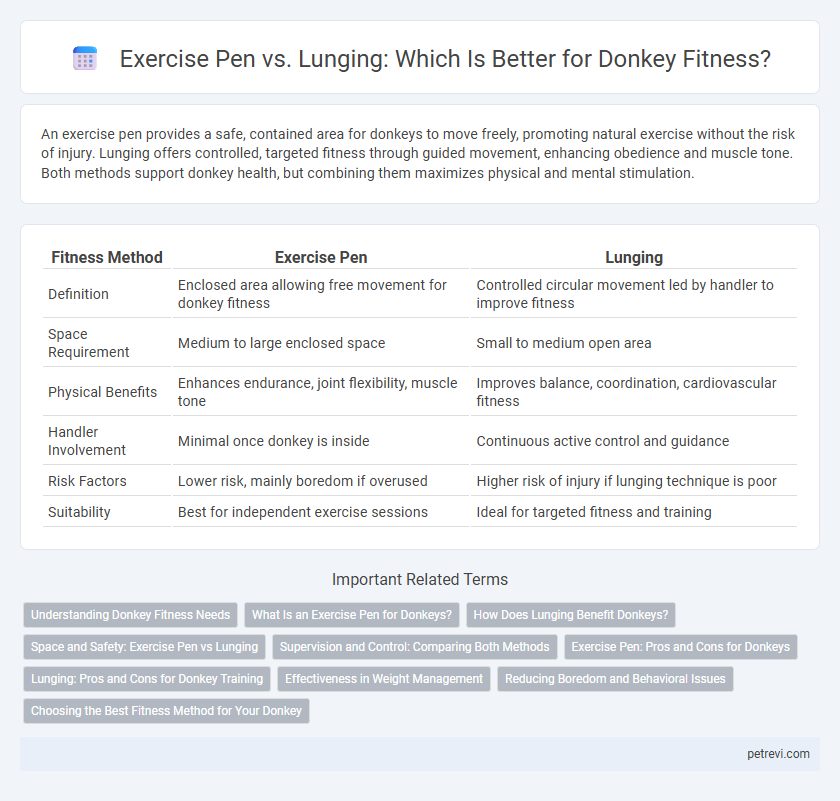An exercise pen provides a safe, contained area for donkeys to move freely, promoting natural exercise without the risk of injury. Lunging offers controlled, targeted fitness through guided movement, enhancing obedience and muscle tone. Both methods support donkey health, but combining them maximizes physical and mental stimulation.
Table of Comparison
| Fitness Method | Exercise Pen | Lunging |
|---|---|---|
| Definition | Enclosed area allowing free movement for donkey fitness | Controlled circular movement led by handler to improve fitness |
| Space Requirement | Medium to large enclosed space | Small to medium open area |
| Physical Benefits | Enhances endurance, joint flexibility, muscle tone | Improves balance, coordination, cardiovascular fitness |
| Handler Involvement | Minimal once donkey is inside | Continuous active control and guidance |
| Risk Factors | Lower risk, mainly boredom if overused | Higher risk of injury if lunging technique is poor |
| Suitability | Best for independent exercise sessions | Ideal for targeted fitness and training |
Understanding Donkey Fitness Needs
Exercise pens provide a controlled environment for donkeys, ensuring safety during low-impact activities that promote joint health and muscle tone. Lunging offers dynamic movement essential for cardiovascular fitness and coordination, catering to a donkey's natural gait and energy levels. Tailoring fitness routines to a donkey's specific age, temperament, and physical condition optimizes overall health and prevents injury.
What Is an Exercise Pen for Donkeys?
An exercise pen for donkeys is a secure, enclosed area designed to allow donkeys to move freely while providing controlled exercise within a confined space. Typically made of durable materials like metal panels or wooden fencing, exercise pens prevent escape and reduce injury risk during physical activity. These pens support muscle development, improve cardiovascular health, and offer a safe environment compared to lunging, which requires more handler skill and can pose balance challenges for donkeys.
How Does Lunging Benefit Donkeys?
Lunging benefits donkeys by improving their cardiovascular fitness, muscle strength, and coordination through controlled, rhythmic movement. This exercise promotes mental stimulation and obedience by encouraging donkeys to respond to voice commands and body language. Regular lunging enhances joint flexibility and overall stamina more effectively than confined exercise pens.
Space and Safety: Exercise Pen vs Lunging
Exercise pens provide a spacious and secure environment for donkey fitness, preventing escape and minimizing injury risks with sturdy, enclosed fencing. Lunging requires a clear, flat area free of obstacles to ensure the donkey's safety and the handler's control, but space limitations can increase the chance of accidents. Properly sized exercise pens generally offer a safer and more controlled setting compared to lunging, especially for donkeys prone to unpredictable behavior.
Supervision and Control: Comparing Both Methods
Exercise pens provide a controlled and confined space allowing close supervision, minimizing risk of injury while ensuring the donkey remains focused on the activity. Lunging requires skilled handling to maintain control over the donkey's movements, relying on the handler's ability to read behavior and adjust commands instantly. Both methods demand attentive supervision but exercise pens offer a more secure environment, especially for inexperienced handlers or anxious donkeys.
Exercise Pen: Pros and Cons for Donkeys
Exercise pens provide a safe, enclosed space that allows donkeys to move freely and build strength without the risk of injury from uneven terrain or escape. They are particularly beneficial for controlled exercise routines, facilitating gradual fitness improvement while minimizing stress on joints. However, exercise pens may limit the natural range of motion and social interaction donkeys require for optimal mental and physical well-being.
Lunging: Pros and Cons for Donkey Training
Lunging offers donkeys a dynamic form of exercise that improves cardiovascular fitness, coordination, and muscle tone while allowing trainers to assess movement and behavior. However, lunging requires skillful handling to prevent stress or injury, and improper technique may lead to joint strain or behavioral issues. Unlike exercise pens that limit movement, lunging promotes controlled, active training but demands more time, space, and expertise.
Effectiveness in Weight Management
Exercise pens provide a controlled environment that limits a donkey's movement, which may reduce overall calorie expenditure compared to lunging. Lunging sessions typically involve continuous, dynamic movement that enhances cardiovascular fitness and promotes more effective weight management through sustained energy use. Studies in equine fitness show that lunging can significantly improve muscle tone and fat reduction, making it more effective than stationary exercise pens for managing a donkey's weight.
Reducing Boredom and Behavioral Issues
Exercise pens provide a controlled environment where donkeys can move freely, reducing boredom and minimizing the risk of behavioral issues like cribbing or kicking. Lunging offers structured physical activity that improves cardiovascular fitness and enhances obedience, but without adequate space, it may not fully address mental stimulation needs. Combining both methods ensures donkeys receive varied exercise and engagement, promoting overall well-being and preventing monotony-related problems.
Choosing the Best Fitness Method for Your Donkey
Exercise pens offer a controlled, safe environment for donkeys to move freely, supporting consistent physical activity and reducing injury risk. Lunging provides a structured workout that improves cardiovascular fitness, strengthens muscles, and enhances obedience through guided movement. Selecting between exercise pens and lunging depends on the donkey's temperament, fitness goals, and available space to ensure optimal health and well-being.
Exercise pen vs Lunging for Donkey Fitness Infographic

 petrevi.com
petrevi.com